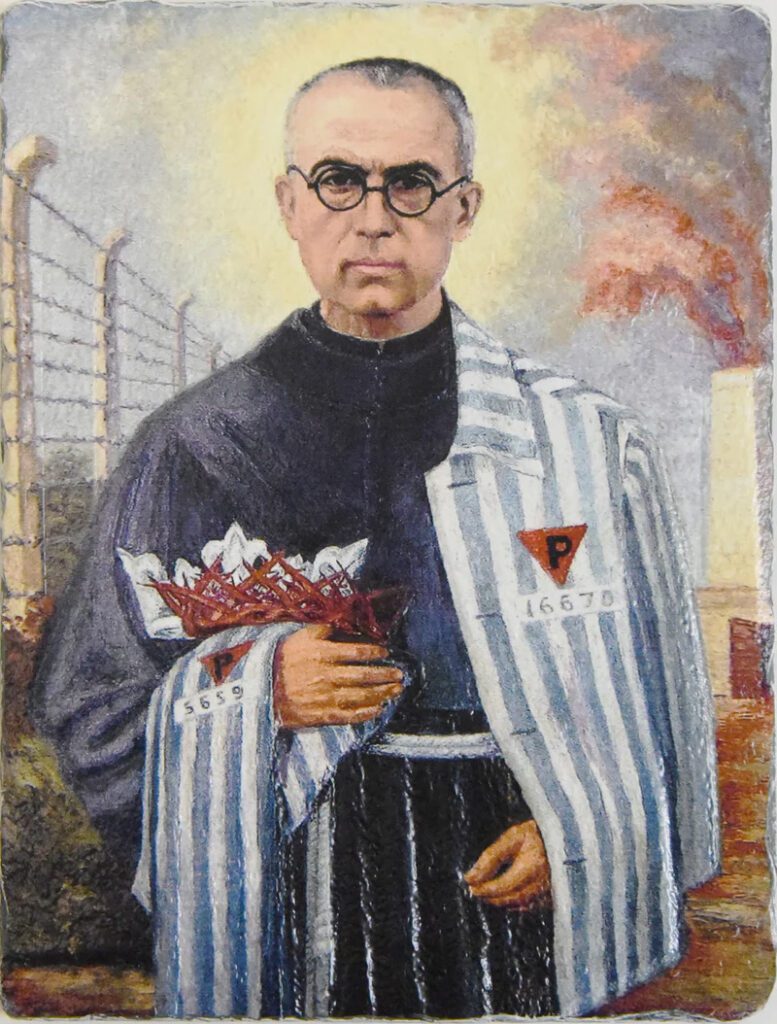
Following the Nazi invasion of Poland in 1939, St. Maximilian Kolbe and several friars were apprehended due to their involvement in media evangelization. The Nazis confiscated all valuable assets from Niepokalonow, while the remaining friars devoted their time to aiding refugees. After a few months, St. Maximilian and his fellow friars were released. Despite the ban on Kolbe’s publications, he succeeded in persuading the Nazis to permit one final magazine printing in 1940. During this period of oppression, the friars turned to Eucharistic Adoration as their central ministry.
In February 1941, the Nazis arrested St. Maximilian once more and dispatched him to the Auschwitz concentration camp, where he was assigned registration number 16670.
In late July 1941, a prisoner managed to escape from St. Maximilian’s barracks. In response, the Nazis selected ten prisoners to be condemned to death by starvation. Among these ten was Polish Sergeant Francis Gajowniczek, who cried out in anguish about his family’s uncertain fate in his absence. In a remarkable and unexpected act, St. Maximilian stepped forward from the ranks and stood before the Commandant.
The Commandant inquired, “What does this Polish pig want?”
Father Kolbe pointed to Sergeant Gajowniczek and declared, “I am a Catholic priest. I would like to take his place, because he has a wife and children.”
After a moment of silence, the Commandant agreed to this request, allowing Gajowniczek to rejoin the other prisoners while Father Kolbe took his place.
Maximilian entered the starvation chamber with the nine other men, where he spent the final two weeks of his life providing encouragement to his companions through prayer and hymn singing in the starvation bunker of block 13.
On August 14, 1941, the eve of the Feast of the Assumption, Maximilian was one of only four prisoners still alive. Impatient captors executed him by administering a lethal injection of carbolic acid and subsequently burned his body in the camp’s crematorium. Saint Maximilian’s Feast Day is celebrated on August 14.
Pope John Paul II canonized Maximilian Kolbe on October 10, 1982, recognizing him as a Martyr of Charity and the “patron saint of our difficult century.”
Sergeant Francis Gajowniczek survived World War II and dedicated the rest of his life to traveling the world, sharing the story of the man who saved his life. He was present at St. Maximilian’s canonization and passed away in 1995.
In today’s Gospel, Jesus tells us that upon the love of God and the love of our neighbor depends all of our faith. St. Maximilian lived the double commandment of love to heroic heights.
He loved God by dedicating his life to the service of God through his vocation as a Franciscan priest. He was deeply devoted to the Virgin Mary and saw her as a symbol of God’s love and mercy.
He also loved his neighbor by his selfless act of offering to die in place of a fellow prisoner. This sacrifice showed his deep love and concern for other people, even in the face of extreme adversity.
In his martyrdom, St. Maximilian Kolbe embodied the essence of Jesus’ teaching in today’s Gospel. He loved God with all his heart and soul by dedicating his life to his religious vocation, and he loved his neighbor as himself by giving up his life to save another. His actions serve as a powerful example of selflessness and the highest form of love for both God and men, as taught by Jesus in these verses.
Let us imitate this great saint, loving God and others to the point of sacrificing ourselves.

